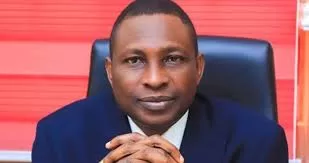
SACK EFCC CHAIRMAN NOW – KOGI ASSEMBLY
The Kogi State House of Assembly has called for the immediate removal of the Chairman of the Economic and Financial Crimes Commission, Ola Olukoyede, over his unprofessional handling of the case against the immediate past Governor of the state, Alhaji Yahaya Bello.
The legislators, during plenary in Lokoja, the state capital, on Monday, condemned what they described as the EFCC operatives’ unprovoked attack on the Kogi State Government Lodge, saying it was an attack on the Governor of Kogi State, Alhaji Ahmed Usman Ododo, and the entirety of the Kogi people.
The lawmakers accused the EFCC of assassination attempt on the former Governor and the incumbent, stressing that the persecution of the former governor had gone on for too long and must stop.
This followed a motion of urgent public importance moved by Hon. Akus Lawal, representing Ankpa 1 State Constituency. Hon Jacob Olawunmi, Ijumu State Constituency, seconded the motion.
Hon. Akus said the EFCC was out to himiliate and possibly kill the present and former governors. His colleagues all supported this.
Hon. Abu Jibril of Ajaokuta State specifically said the EFCC boss should be prosecuted for allegedly attempting to kill the governor. He called on the President to remove him immediately.
According to him, the EFCC’s conduct shows that the chairman is incapable of leading a supposed impartial agency like the EFCC.
“The Chairman has shown incompetence that warrants his removal,” he said.
Hon Bode Ogunmola, Ogori/Magongo State Constituency (PDP), said, “If I am in London and there is a crisis, if I get to the Nigerian House, I will feel safe. If I am in Abuja and there is a crisis, I believe that if I get to the Kogi Lodge, I will be safe. For the EFCC Chairman to order that fire be opened on the official lodge of the Governor, he should be sacked and prosecuted. We should be told why he wants to kill our Governor.”
The Majority Leader of the House of Assembly, Hon. Suleiman AbdulRazak, alleged that officials of the EFCC were begging the former Governor to let them pretend as if he was arrested.
He said it was an embarrassing act, which showed that the anti-graft agency was acting a script written by some political enemies of the former Governor.
The lawmaker therefore said the President should be notified of the assassination attempt on the present and former Governors; adding that the whole drama was a show to embarrass the former Governor.
He concluded that, on the fateful night, a coup attempt was committed at the Kogi State Governor’s Lodge and called on the President to immediately remove the EFCC Chairman to save the nation from further embarrassment.
The lawmakers concluded that the EFCC had an agenda different from the fight against corruption, which had been revealed by the way the Commission approached the issue of arrest.
This, they said, must be condemned by all well-meaning Nigerians.
Hon Yahaya Umar, representing Omala State Constituency said, “The unlawful conducts of the EFCC show that the intention of the chairman is not to arrest former Governor Yahaya Bello, but to ridicule the state.
“The chronology of how the event happened shows that the problem of the chairman is not with the offences being alleged, but that they want to disgrace the defendant and Kogi State in general.”
On her part, the Deputy Speaker of the State House of Assembly, Rt Hon. Comfort Nwuchiola Egwaba, stated, “The EFCC is just trying to give the former Governor a bad name through their media trial. The EFCC is not sincere in this fight. It has an agenda it is pursuing and the entire people of the state, particularly the women and youths, will not accept this.”
In the same vein, the Kogi State House of Assembly also passed a resolution, commending President Bola Ahmed Tinubu, GCFR for his economic policies which are aimed at building a strong and virile economy that will be the envy of all.
The Speaker of the Kogi State House of Assembly, Rt. Hon. Aliyu Yusuf, who read out the resolution of the House, stated, “The House formally categorizes the April 17 and September 18 incidents as assassination attempts on the former Governor, and by extension, a threat to the life of Governor Ahmed Usman Ododo.
“The unprovoked attack on the Governor’s Lodge and the firing of live rounds within a diplomatic residential zone further demonstrate that the EFCC has fully marinated in a sense of its own importance and power and now considers itself not only above the law but unanswerable to anyone or institution for its actions.”
“Because the EFCC Chairman has shown constantly, gross incompetence, the House has resolved that the President should relieve him of his appointment with immediate effect and replace him with a competent officer who will give Mr. President’s crusade for rule of law the needed effectiveness,” the lawmakers demanded in their resolution.
 Premium News
Premium News